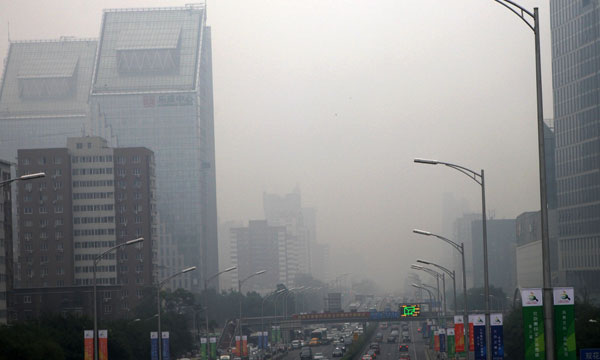Editor's note: This article is run by the Guardian, which, together with China Daily and other 32 global media, forms Climate Publishers Network.
 |
|
Heavy smog in Beijing on September 22. Urban smogs contributed to an estimatee 670,000 deaths in 2012. Photograph: ChinaFotoPress via Getty Images |
Qi Ye, director of public policy centre in Beijing, says China is showing 'global leadership' on climate change and it will look to clean energy technologies
China may aim for an earlier greenhouse gas emissions peak before its 2030 deadline, putting a greater onus on Australia to work with its key trading partner on renewable energy rather than fossil fuels, says a leading Chinese analyst.
Qi Ye, director of the Brookings-Tsinghua Center for Public Policy in Beijing, said that Chinese policymakers were striving to ensure emissions peaked ahead of a schedule agreed in a joint climate deal with the US earlier this year.
"China hopes to peak as early as possible because it understands it's in the national interest and to the benefit of the people in terms of health considerations," Qi told Guardian Australia. Urban smogs contributed to an estimated 670,000 deaths in 2012.
Readers' photos of smog in China View gallery "A 2030 peak is very ambitious, it's very challenging," said Qi. "I think most people underestimate how challenging that is. Everyone wants China to have an earlier peak but no one wants it more than China itself."
China will introduce a national emissions trading scheme in 2017 and will try to ensure its emissions peak even as 82 million of its people live on less than $1 a day.
Australia's environment minister, Greg Hunt, has compared Australia's emissions reduction target favourably with China's. He said last week that China was "a country with up to a 150% increase in emissions" between 2005 and 2030.
But Qi said China was showing "global leadership" on climate change and that Australia would have to forge a new export relationship with China as the economic giant's coal imports, which have slumped this year, begin to slow.
"There will probably still be a high level of coal consumption but we will not see any significant increase in demand for coal in the Chinese economy," Qi said.
"There's huge potential in clean energy research, development and deployment between China and Australia. A quarter of all new renewable investment in the world is coming from China, we are talking about a $1.8tn investment. China would be very happy to have the abundant clean energy resources Australia has.
"In the past we thought it was a cost to address climate change. Then we realised not addressing it will cost us more. By developing clean energy technologies, we bring more economic opportunities. Every country should look at this with fresh eyes and seize the opportunity rather than just talk about the cost of it."
Meanwhile, the number of large businesses joining a call for a global carbon pricing market has reached 4,000 - most notably oil giant Royal Dutch Shell, the World Bank says.
"Carbon pricing is an efficient, necessary way of reducing emissions," said Vikram Widge, head of climate and carbon finance at the World Bank's climate change group.
"The momentum behind it is huge. It's a critical way to reach our goals but it isn't sufficient. We have to build upon it."
Widge said Australia, which scrapped its carbon price last year, would need to find an alternative system to meet its goal of a 26% to 28% reduction in emissions by 2030, based on 2005 levels.
"Australia has made a commitment and it will need to find a way to meet that target. If it chooses to do it without a carbon pricing it will have to find another way."
The Coalition's Direct Action climate policy has set aside $2.55bn to fund emissions reduction from businesses that wish to do so, although much of the reduction will depend on how the government treats firms that do not apply for the grants and maintain, or increase, their emissions.
